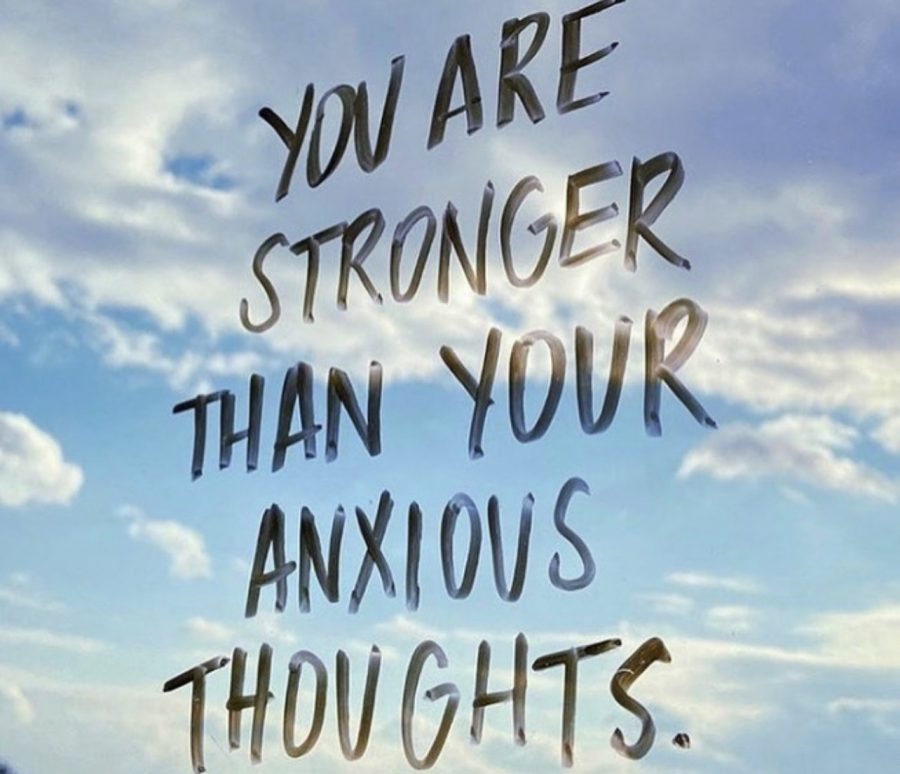The battle of mental health
June 17, 2021
I struggle with anxiety and depression.
Growing up, mental health wasn’t something that I heard a lot about. Teachers didn’t talk about it besides the usual health class conversations about hypothetical cases, my parents and family didn’t talk about it because mental health isn’t really something we talk about in Romania, and my friends just didn’t talk about it either. Overall, I didn’t hear the words “anxiety”, “depression”, and others related to mental health around me.
When I was in high school, I was 16 and I lost about 20-30 pounds. Doctors couldn’t figure out why and I couldn’t stop feeling nauseous. That lasted until I was 22. During this time, I fluctuated between 100-115 pounds. I was considered underweight, but there was nothing I could do. I tried everything I could for stomach issues. But when I was a sophomore in college, I had an anxiety attack. Soon after, I was diagnosed with anxiety.
This diagnosis was the best thing that could’ve happened to me. I started getting treated for anxiety. After a few months, I started gaining weight and feeling a lot better. But of course, the battle wasn’t over.
A month ago, I started struggling with depression. My parents decided to get a divorce. It left me shattered. I would cry almost on a daily basis, my sleeping and eating habits were terrible, and I got to the point where the simplest tasks took so much energy to complete, if I ever completed them. So I made a daily goals list. This list does not have chores or work on it, but it’s a list of things to do to take care of myself. Things like eating 3 meals a day and drinking water and exercising. These things help me feel like I’m moving forward. Now, a month later, I can say that I’m in a better place. Am I feeling 100%? No. But that’s going to take time. And that’s okay! I’m going to keep working on myself and do everything I can to overcome this.
I’ve always been pretty upfront about my mental health with my students, friends, and family. Over Memorial Day weekend, I realized something. A former classmate, and current teacher, told me that my talking about my mental health struggles helps her realize that she’s not alone.
It got me thinking.
Teachers are isolated in their classrooms, barely talking to each other, and don’t realize that their colleagues are going through the same struggles. Same goes for the students. Students have been isolated at home for the past year. We don’t talk to each other about mental health! But we need to.
That’s why I wanted to share my story. I wanted to tell you all that you’re not alone. Mental health is something that the majority of us deal with in silence, but we shouldn’t be silent. We should share our experiences because by sharing what we are going through, we can support each other.
Below, Kim Louvin, Barlow’s social worker, writes her own story and advice for readers:
It’s Okay not to be Okay
Mental Health Amidst Quarantine, the Pandemic, these moments in history
As a social worker, I’m “trained” in the best practices of mental health coping, stress management, anxiety and depression management, and generally spend much of my time focused on helping others become and remain aware of their healthy and unhealthy behaviors. Many times, conversations will begin about a “presenting problem” where someone comes to me (or is sent to me) because a behavior of theirs resulted in an unwanted outcome or they don’t know what behaviors to do to prevent unwanted outcomes.
This all sounds pretty technical, doesn’t it? To break it down, sometimes, we experience overwhelming physical sensations of wanting to be anywhere but where we are and we don’t know what to do with those feelings… so we yell, cry, run away, can’t move, or simply find ourselves “zoning out”. This can be many different things: anxiety, the beginning of a panic attack, trauma flashbacks due to something reminding us of something else, or just a moment of sheer overwhelm. All of these things are 100% normal to happen from time to time. I tell students, “when you have that moment of wanting to run away and hide in the bathroom, come to my office instead, we can talk through it or I can sit with you while it passes.” The issues become when these feelings of overwhelm become so common that we can barely complete our daily lives, we can’t make it to or through any classes, or we can’t get to sleep at night or wake up in the mornings. This is where mental health challenges can become tricky and warrant bigger supports than we can manage on our own. This is also 100% normal at times in life, especially during a global pandemic where we are all forced to be physically separated from any sense of normalcy, maybe with other people we don’t enjoy spending time with, and are told that our physical health may be in danger … and the information changes regularly.
I have to do this work personally with myself. These last 18 months have reminded me of that daily as I’ve faced the same struggles in a similar way to many of you of missing friends or family or being worried for my own health in recovering from COVID, their health as others around them have differing views on COVID, or the health of my friends pursuing justice for lost lives who endured varying experiences in that quest for justice and peace. There was no escape to the reality of 2020 and “the only way out is through” rang true for me day after day.
I intellectually understood all of this and even felt “prepared” going into this school year to help students, families, my coworkers, and others manage the waves of anxiety, depression, grief, panic, loss, and the other myriad of feelings that come with all that we’ve experienced in the last year and a half. No matter our perceptions on the pandemic and any of the political and societal events that have taken place, we have all LOST something. We lost how we thought the last 18 months would go. We lost experiences we were looking forward to, memories we can never re-make, and chances we wonder if we should have taken before. We are all collectively grieving the loss of something that never was. Anyone who’s ever had a crush for months that you kept to yourself and then saw them dating someone new who makes them happy can relate to this feeling – on a much different level of course. That feeling of ‘what if?”. That feeling of “did I just miss out on something great?” That feeling of wondering if you made a mistake by playing it safe, by waiting, by biting your tongue. Maybe you did, but maybe that feeling is a feeling that can urge you to learn what it can be like to be bold as we find ourselves entering a new season where being brave, feeling our feelings, and opening up about them can be what will save us, reconnect us, and help others feel less alone.
One of my favorite authors, social workers, researchers, and humans, Brene Brown has many quotes I love that constantly challenge me to walk the walk, not just talk the talk. One is “The courage to be vulnerable is not about winning or losing, it’s about the courage to show up when you can’t predict or control the outcome.” This quote speaks to me as I write this to you because as prepared as I felt professionally to do my job, I had no idea the personal challenges I would face over the last 18 months and how all of the things I was encouraging others to do I would need just as – if not more so – than those I was talking to.
It can be easy to see folks around you who are posting on social media, not posting on social media, or existing in a way that generally looks as if they have everything figured out and that they are ‘fine’ while you are crumbling inside. I want to remind you that we often don’t post the hard moments and we often only share those with a few close people, so we truly can only know ourselves and our close friends. Take comfort in that. We have ALL been through something that is life changing, traumatic in a very real sense, and a prolonged stressor that has kept our fight-flight-freeze system activated while we’ve had very different access to the things we once used to healthily cope with stress.
We weren’t designed to deal with this much stress on a regular basis, but if you’re reading this today, you made it through this 18 months and are here, still connected, still breathing, still taking each day step by step. I am proud of you. I hope you can be proud of yourself too. Even if you have taken sidesteps and slipped into habits you know may not be the best, you have made it through and have persisted through.
If you are reading this and feel like you’ve barely made it through, that’s okay too. I relate to that strongly in some moments. I’ve learned what anxiety, depression, panic attacks, and loneliness from isolation from family can truly feel like in those 2am moments after going another 14 days seeing no one except my dog and my coworkers or friends through Google Meets or Zoom. It wasn’t easy, but I leaned HARD into the advice I often give, got back in touch with a therapist I’ve worked with for several years to vent when it became heavy, and kept a few close friends on speed-text to remind me that each day is a new day or to just sit virtually with me and watch a show, listen to an album, or look at memes together. I have experienced waves of each of these challenges at varying times in life, which led me to want to become a social worker and offer a calm space amidst the storms. This last year, however, things became more real as I spent weeks with only my dog, across the country from family, and had to find new and creative ways to care for my mental health while also caring for others’ and also staying safe. It was not easy, and I am proud of you for making it through. The last 18 months were about survival, now, we can begin to craft a new normal. It’s okay not to be okay and it’s okay to seek support. We all deserve it and we are all human. I would NOT be who I am had I not sought help and it is NOT weakness to seek support. We do not tell people to ‘suck it up’ when their arm is clearly in need of a doctor, we should not shame anyone for seeking mental health support.
Whatever you did to make it through this time, it got you through this time. If you turned to things , habits, and coping mechanisms that you know aren’t the healthiest, I encourage you to consider connecting with support to develop and learn healthy, safe, legal, sober coping strategies. Those are my main categories I try to teach people in my office and those are the ones that will stick with you for a lifetime and help you stay more on than off track. If you are needing extra support, therapy is just a few calls or emails away and I personally believe everyone should see therapy as essential as their yearly doctor’s visits. Three therapy sessions with someone who truly knows you can help you be the best you. PsychologyToday.com and TherapyDen.com are great places to start researching someone who fits well with you for you to talk to. If you need someone to talk to in an urgent moment, I encourage you to check out https://oregonyouthline.org/ and their 100% free text support line. They began as a suicide-prevention resource and have become a general mental health resource as well.
Whatever the last year and a half has sent your way, know that you’ve made it to this shore. You rode the waves, were carried by the waves, and you made it here, now. Take a deep breath. Be proud of yourself. Do the next right thing for you and I hope you’ll consider stopping by my office, emailing me, or connecting with the resources offered by myself and the Counseling Office to help you be successful as YOU, not just as a student. You matter and you belong. You can email me at [email protected] and I will do my best to get back to you quickly. I am generally not available in the summer via email, so please know that I will reply when I’m able to and look forward to connecting with you as we walk this new normal together. We have a chance to do things differently and truly FEEL our feelings, express them in healthy ways, and come together in vulnerability versus stuffing away the hard things or hiding from them. I’m choosing this new path, will you join me? If you’re looking to hear more about what it can look like to choose to accept that “it’s okay not to be okay,” check out the 16 recorded podcast-like episodes from the after-school groups I ran during Quad 4. You can access them here https://tinyurl.com/kimlouvin





